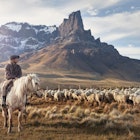
The very word ‘Argentina’ evokes passion and extremes – think tango, Maradona, Eva Peron – but it is only as you stand among some of the world’s most shapely and forbidding mountains, or teeter at the roaring edge of Iguazú Falls, that you realise the extremes here are natural.

The highest peak outside of the Himalayas rises in Argentina, not far from a vast expanse of flat, outback-like pampas the size of neighbouring Chile. The world’s largest waterfall system thunders through rainforest, and glaciers crackle around the ankles of the Andes – almost 50 of them in one national park alone.
There are Argentine towns that are part of the lexicon of world adventuring – El Chaltén, Mendoza, Bariloche – and peaks that stir anxiety in even the boldest mountaineers.
The Andes form a serrated barrier along the country’s entire western border – all 5000km of it. These peaks are shaped by some of the world’s fiercest weather, with both the Roaring Forties and Furious Fifties slicing through the country. It’s in the Andes that you’ll find several lifetimes’ worth of Southern Hemisphere summer adventure opportunities beckoning: trekking, mountaineering, white-water rafting… even land sailing.

Diving
Fancy diving off the southernmost continental tip in the world? Ushuaia has a number of great dive sites, including plenty of shipwrecks and swirling kelp forests through the Beagle Channel – needless to say, drysuits are the order of the day. At Punta Loma on Península Valdés, there’s a great diving (or snorkelling) experience among a sea lion colony. For something very different, head to Bariloche to dive in the alpine Nahuel Huapi Lake, 760m above sea level. In the gin-clear waters you’ll spot trout and explore an underwater museum of submerged log sculptures around Isla de las Gallinas.
You might also like this: 3 reasons to visit Argentina's Parque Nacional Patagonia right now
Whitewater paddling
Rivers run like veins from the Andes, creating a wealth of whitewater opportunities. Mendoza is one of the best rafting bases, with commercial trips running on four rivers, including the famed Atuel and the class IV Mendoza and Diamante rivers. For paddlers, Patagonia does what Patagonia generally does: provides masterful scenery that almost eclipses the activity itself. The milky, forestwrapped waters of the Río Hua Hum (San Martín de los Andes) and the boulder-strewn Río Corcovado (Esquel) are especially beautiful.

Cycle touring
The roads of Argentina are a playground for the cyclist willing to explore, but for a truly memorable experience here let the ripio (dirt roads) guide you. Steer away from the tourist hotspots of the south, and head instead to the lesser frequented northeast regions of Catamarca, La Rioja and Mendoza. Pushed for time? Dive right in at the deep end with a one-day off-road adventure on the old road from Londres to Tinogasta. Here, you’ll pedal through dusty Wild West-esque landscapes: past flowering cacti, up long-forgotten switchbacks and
along precarious ledges, which boast a stomach churning 1700m drop to the valley floor.
If you find yourself near the city of Mendoza, take the rough and ready Route 13 to Uspallata. Expect a tough slog and steep inclines to make the highpoint at 3200m above sea level. But the rewards on offer for such a challenging ride are plenty: swooping condors, snow-capped peaks, sublime sunsets and the remarkable ‘hill of seven colours’, just outside Uspallata.
Also not to be missed is a ride from the city of Salta to the vineyard mecca of Cafayate, via Cachi. The paved Route 33 winds steadily up to Piedra Del Molino pass at 3348m, before taking on a whistlestop tour through the multicoloured mountains of Parque Nacional Los Cardones. Then it’s on to the lunar landscapes of the Valles Calchaquíes, and (at last) a nice glass of vino tinto in Cafayate.

Mountain biking
Strangely, given the landscape, mountain biking remains fairly undeveloped in Argentina, with little dedicated singletrack, yet MTB legend Hans Rey rated a ride from Tilcara to Calilegua, in the country’s northwest, among his top three adventure rides in the world. Bariloche, the thriving heart of Argentina’s Lake District, is arguably the most established area, with a summertime mountain-bike park among the ski fields of Cerro Catedral; in 2016 it hosted a round of the Enduro World Series. Expect loose, dusty riding.
You might also like this: Iberá National Park: Northeast Argentina's wetland wonderland
Windsurfing & kitesurfing
Wind is the driving force again at the well-named Dique Cuesta del Viento, or ‘slope of the wind reservoir’. Set in a curious desert landscape – it gets rain just a handful of days each year – the reservoir is considered one of the premier windsurfing and kitesurfing destinations in South America, if not the world. Mornings here are deceptively calm (grab a sleep-in), but in the afternoon the winds are as reliable as clocks, particularly from October to early May. The reservoir is beside the town of Rodeo, 200km north of San Juan city.

Land sailing
When a lake has no water, your sailboat isn’t going anywhere... unless it has wheels, of course. Across the clay surface of Pampa El Leoncito, 25km from the town of Barreal, carrovelismo, or land sailing, is big, with ‘wind cars’ recording speeds in excess of 100km/h across the smooth, 13km-long lake bed. Andean mountains tower to almost 7000m beyond the lakeshores, and the reliable evening ‘conchabado’ winds can reach up to 80km/h, thus providing ample propulsion. Take a tandem joyride with a guide, or work your way up to driving your own single-seater.

Trail running
Hard mountains serve up hard events, and Argentina is home to a couple of arduous ultramarathons. The Patagonia Run, held in April, has seven distances, ranging from 10km to 145km, sending runners out from the town of San Martín de los Andes through the stunning Andean scenes of Argentina’s Lake District. It’s a qualifying race for the Ultra-Trail du Mont Blanc and the Western States 100-Mile Endurance Run.
You might also like this: Blood, sweat and tears: 10 epic ultra running races that are worth the effort
At about the same time, also keep an eye out for The North Face Endurance Challenge. Involving distances up to 80km, it’s held at changing locations, including Bariloche, San Martín de los Andes and Córdoba.
San Martín de los Andes is also the setting for La Mision, a four-day, three-night self-sufficient trekking event. It’s less a race than a personal journey, ‘to finish is to win’ is its motto, taking participants through 160km or 200km of epic Andean terrain and sleeping wherever they decide to throw down their tent.

Mountaineering & climbing
El Chaltén is a true mountaineers’ town, but the prize peaks here – Monte Fitz Roy and Cerro Torre – beckon only the hardiest climbers. The finger-like Cerro Torre is considered one of the world’s toughest climbs, with a history shrouded in controversy and mystery – it wasn’t climbed until 1959, 1970 or 1974, depending upon which account you believe.
If, as is almost certain, these two mighty peaks are beyond you, 2248m Cerro Solo might appeal. Climbing from Laguna Torre, it’s a straightforward mountaineering ascent, including some glacier travel, to a peak that sits eye-to-eye with Cerro Torre and Fitz Roy – the views can be sublime.

Trekking
With Andean mountain tops forming a 5000km spine along its shapely back, Argentina is perfect trekking country, and the best things happen at the pointy end.

Patagonia
Not for nothing is this place synonymous with adventure – here banshee winds, glaciers, cruel winters, frost and rain have carved an extraordinary and brutal landscape. The most famous trek in the land, the Torres del Paine, may be just across the border in Chile, but hike out from El Chaltén into Parque Nacional Los Glaciares and you might wonder how it could be topped.
Treks here lead up to Laguna de los Tres, a stunning lake pooled at the foot of the mighty Monte Fitz Roy, one of the world’s pin-up mountains, its enormous and distinctive summit rock towering more than 2km above the water. Hop one valley south and there’s a trekking route up to Laguna Torre and the Mirador Maestri, a vantage point that peers across glaciers to the needlepoint summit of Cerro Torre.
You might also like this: 10 things to do in Patagonia
The most committing trek is a circuit of Monte Fitz Roy, traversing the Patagonian Ice Cap, the world’s largest icefield outside Antarctica and Greenland. Hikers typically cross the range at Paso Marconi before snowshoeing or cramponing along the ice cap behind Monte Fitz Roy and Cerro Torre, returning towards El Chaltén over the Viedma Glacier and Paso del Viento.

The Lake District
The region around Bariloche offers equally good trekking, including a traverse of around four or five days through the spectacular Parque Nacional Nahuel Huapi, where you can expect to see Andean condors and craggy peaks above, and wind-pruned lenga forest and alpine lakes below.
The nearby Volcán Lanin towers over the northern Lake District, rising directly from a low plain to a height of 3776m. From most places, its heavily glaciated peak looks impenetrable, but a trekking route up the eastern slopes provides a strenuous (but not technical) course to an exhilarating summit.

Tierra del Fuego
In Argentina’s deep south, a hop-off point for Antarctica, hikers can venture up into the rugged Fuegian Andes, which arc around the world’s southernmost city, Ushuaia. Conditions are so harsh here that vegetation stops growing at around 600m, and unmarked routes provide a sense of remote exploration in keeping with the setting.
Further north, rising above Mendoza, Aconcagua (6962m) is the world’s highest mountain outside the Himalayas and it straddles the divide between trekking and mountaineering. The ascent of the peak, which is the second highest of the world’s Seven Summits, usually requires a commitment of about two weeks. It isn’t technical, but should not be underestimated as it has the mountaineering-style complications of extreme altitude and fiercely fickle weather changes. The most popular approach to the mountain is the Northwest Route through Plaza de Mulas, but the longer, more scenic and more technical approach is along the Valles Vacas and the Polish Glacier.
Unsurprisingly, there are many great places to rock climb across this craggy country. Frey, on the granite spires of Cerro Catedral, above the climbers’ haunt of Refugio Frey, is considered by many to be the finest climbing area in South America. The bulk of the climbs are graded around 5.9 to 5.12, and stretch up to 10 pitches. Rivalling Frey is Los Gigantes,
about 80km west of Córdoba. The mountains here aren’t high – up to about 2300m – but there are plenty of limestone crags and up to 100 (mostly) sport routes. As a bonus, you’ll probably get to climb with Andean condors cruising overhead.
Explore related stories





 Wildlife & Nature"The perfect antidote to sterile city life" – why fly fishing has millennials hooked
Wildlife & Nature"The perfect antidote to sterile city life" – why fly fishing has millennials hookedMar 2, 2020 • 7 min read
 Wildlife & NatureHow to hike Dientes de Navarino, the southernmost trek in the world
Wildlife & NatureHow to hike Dientes de Navarino, the southernmost trek in the worldJan 31, 2020 • 4 min read




